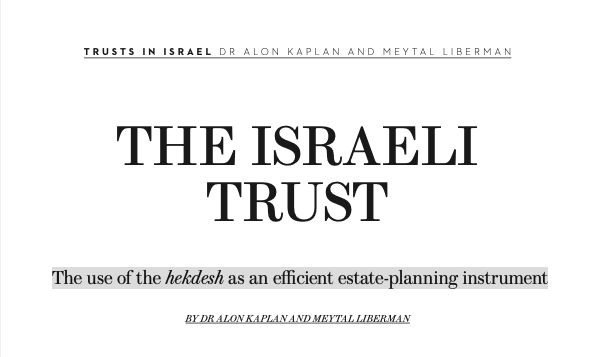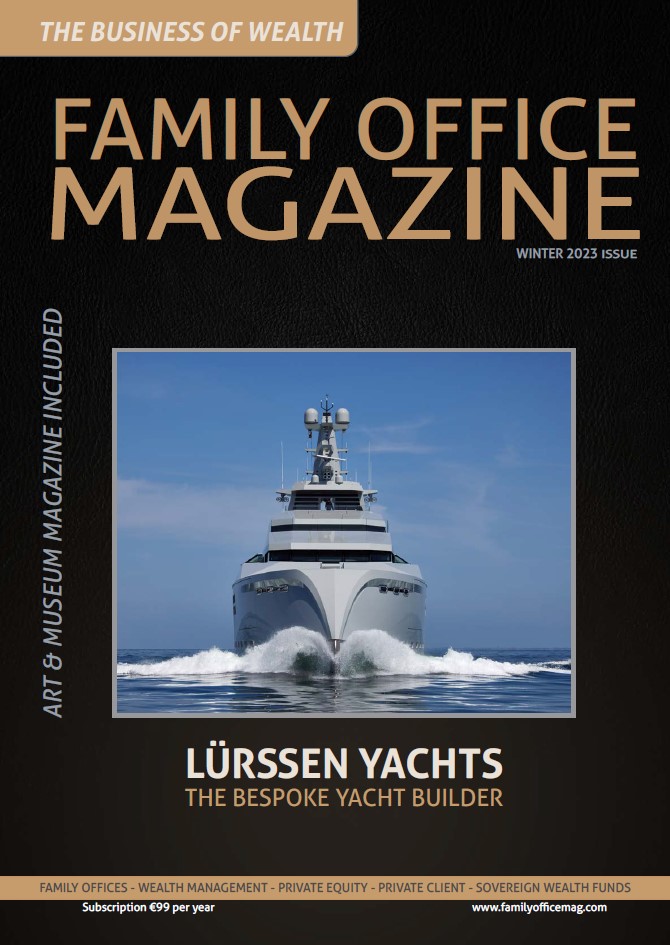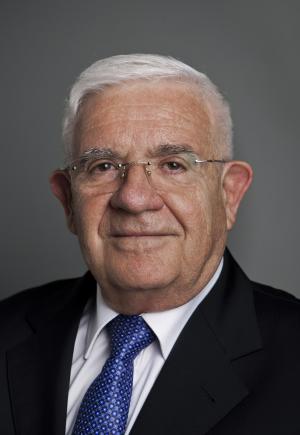TRUSTS AND SUCCESSION LAW IN ISRAEL
January 2026
Dr. Alon Kaplan, Advocate & Notary, TEP Meytal Liberman, Advocate, TEP This article was first published in Step Journal Abstract The Succession Law and the Trust Law in Israel have certain provisions which may turn a trust ineffective when the settlor of the trust wishes to avoid inheritance procedure. The article will discuss problems and
- Published in Articles
No Comments
The Ha’avara Transfer Agreement
November 2025
Alon Kaplan and Meytal LibermanThe interesting story of how the Transfer Agreement (in Hebrew: “Ha’avara”), an agreement signed between the German government andZionist authorities in 1933 to encourage Jewish emigration from Germany to Palestine, helped Jewish expatriates transfer their assets totheir new home with the activities of two trust companies in Germany and Palestine. Taken
- Published in Articles
In selecting an appropriate system of distribution in Israel, a foreign business entity must take into account the size of the country, its market conditions, financing requirements, brand recognition, and different legal regulations as well as profit margins on the product, retailing sophistication, and the need for post-sales service. Israel passed the Agency Contract (Commercial
- Published in Articles
Gain insights into Israel's evolving succession landscape and discover when to strategically transition from wills to private trusts for optimal estate management.
- Published in Articles
Optimize your estate planning with private trusts in Israel, offering enhanced protection and flexibility for beneficiaries beyond traditional wills. Discover more now.
- Published in Articles
Find out how private trusts in Israel can revolutionize your succession planning with charitable benefits and tax efficiency strategies—what's the catch?
- Published in Articles
Be informed about private trusts in Israel and their tax compliance for succession planning. Discover essential strategies and remain compliant with Israeli tax laws.
- Published in Articles
Private trusts in Israel provide a unique blend of secular and Jewish law, offering flexible succession planning solutions—discover how they align with your needs.
- Published in Articles
Intrigued by how private trusts in Israel can streamline your estate planning and avoid dual succession proceedings? Discover the key steps and benefits today.
- Published in Articles
Optimize your estate planning with private trusts in Israel to prevent family disputes and reduce litigation—explore how trusts offer peace of mind.
- Published in Articles
Optimize your business succession in Israel using private trusts to avoid disputes and ensure seamless transitions. Discover how these strategies can benefit you.
- Published in Articles
Curious about how private trusts simplify Israeli property succession and bypass probate complexities? Discover the benefits and legal insights essential for your estate planning.
- Published in Articles
Find out how private trusts navigate Israeli inheritance laws and forced heirship rules to ensure seamless wealth transfer and succession rights protection.
- Published in Articles
Join us to explore how private trusts in Israel offer unique tax benefits and flexible succession planning that could enhance your estate's value.
- Published in Articles
Join us as we explore how private trusts in Israel offer a unique advantage in bypassing traditional probate, ensuring privacy and control over your assets.
- Published in Articles
Investigate how Israel's 2006 Trust Law empowers private trusts to effectively replace traditional wills for succession planning. Discover more about this legal evolution.
- Published in Articles
Dr Alon Kaplan 12 August 2024 Israel’s Immigration Continues, Supported By Tax Incentives We carry this brief commentary by a long-standing figure in the world’s trust and estates planning industry with a view on Israel. This news service – as seen by this example – continues to cover the ways in which people migrate to new jurisdictions, sometimes to
- Published in Articles
Article published in the Magazine Private Banking January 2024 Dr. Alon Kaplan and Meytal Lieberman In recent years, newspapers have published reports of “blind Trust” in connection with a mechanism designed to prevent conflicts of interest of public servant (“the official”)l, such as ministers and the prime minister. In the United States, blind trusts are
- Published in Articles, Books, Business, Family office
נאמנות בישראל
January 2024
Alon Kaplan היא מושג (Trust) הנאמנות משפטי. הכוונה היא למרקם של יחסים משפטיים לפיהם הלקוח אשר הינו מייסד מעביר (Settlor) הנאמנות בעלות בנכסים לידי נאמן ומעניק לנאמן (Trustee) (או למספר נאמנים) זכויות לפעול בנאמנות על פי כתב נאמנות והחוק. בשונה מהמצב בשליחות פטירתו של הלקוח או של נהנה איננה מסיימת את הקשר המשפטי והנאמנות תמשיך
- Published in Articles
INTERGENERATIONAL TRANSFER OF A FAMILY BUSINESS
January 2024
Alon Kaplan Many businesses in Israel are owned and managed by families. In many cases, the businesses’ founders are the family’s father or mother, although there are also businesses that brothers and sisters establish. The result is that the founders of the businesses may include individuals who have established a successful business and have a
- Published in Articles, Books, Business, Family office
Alon Kaplan and Meytal Liberman Abstract – How to use a trust as an alternative to a will to transfer assets to the next generation? This article will answer this question by first introducing the reader to inheritance and trust law in Israel. It will explore the endowment and how it should be used in
- Published in Articles
Trusts & Trustees – Alon Kaplan & Meytal Liberman Abstract – How to use a trust as an alternative to a will to transfer assets to the next generation? This article will answer this question by first introducing the reader to inheritance and trust law in Israel. It will explore the endowment and how it
- Published in Articles
Alon Kaplan
- Published in Articles
Estate planning for the family business
January 2020
Alon Kaplan, Meytal Liberman This article provides an overview of the factors to be considered in order to structure and grow a family business in Israel.
- Published in Articles
Inheritance Law and Procedure in Israel
June 2019
Alon Kaplan & Meytal Liberman
- Published in Articles
Alon Kaplan
- Published in Articles
The Israeli Trust
June 2019
Published in STEP Trust Quarterly Review Volume 17, Issue 2 2019 Dr. Alon Kaplan and Meytal Liberman ABSTRACT• Israel’s trust law applies to any trust relationship; however, the main route to create a private trust is by creating a hekdesh, also known as an endowment. The hekdesh is a document signed unilaterally by the settlor
- Published in Articles
Trusts and estate planning in Israel
December 2018
Alon Kaplan & Meytal Liberman Israel has long been a ‘home’ for many international families. The Law of Trust, the Law of Contract, and the Law of Agency together form the legal framework for Trusts and estate planning in Israel.
- Published in Articles
Alon Kaplan & Meytal Liberman Real estate trust in Israel is a useful legal structure for families who wish to register real property in the name of a corporate body acting as a ‘transparent entity’ and keep tax advantages granted to individual persons. This structure may be found particularly useful and efficient for non-Israeli families
- Published in Articles
A Special Collection Of Articles On Trusts & Estate
September 2018
Alon Kaplan
- Published in Articles
Alon Kaplan & Meytal Liberman
- Published in Articles
Alon Kaplan Books – Contribution of chapters on Israel
- Published in Articles
Israeli Family Offices
March 2017
AloAlon Kaplan, Lyat Eyal, Ori Ephraimn Kaplan
- Published in Articles
Corporate Law in Israel
January 2017
Alon Kaplan, Lyat Eyal and Diana Apelboim Ladovsky
- Published in Articles
Alon Kaplan and Lyat Eyal The article reviews the Israeli Banking Ordinance 1941, whose provisions relating to joint ownership of assets in Israel are quite unique in Israeli law. Non-residents, both clients and professionals, owning assets in Israel, unfamiliar with local laws and accustomed to the laws in their relevant jurisdictions, are often surprised. Estate
- Published in Articles
Alon Kaplan and Lyat Eyal Freedom of succession has created many discussions over the past few months for estate and trust professionals. This is mainly due to the EU Regulation, which for many is a significant development towards freedom of succession. Israel is a country of immigration and emigration. As movement of individuals between different
- Published in Articles
Alon Kaplan and Lyat Eyal This article treats the Israeli Hekdesh coupled with an Israeli underlying company as a foundation. It summarizes the taxation of foundations and trusts in Israel, as well as the main provisions of the relevant legislation as revised in 2013 which is now final and effective. The article then continues to
- Published in Articles
Cross-Border Estate Planning – The Israeli Angle
January 2015
Alon Kaplan and Lyat Eyal
- Published in Articles
Alon Kaplan and Lyat Eyal In Israel, local laws and governmental agencies regulate estate and inheritance matters. Consequently, in order to distribute estate assets, a petition for an inheritance or probate order must be filed locally. Such filings may be avoided by the establishment of a trust during one’s lifetime. By transferring assets to a
- Published in Articles
Hekdesh – The Israeli Foundation
July 2012
Alon Kaplan and Alan Krost The article illustrates that the Hekdesh, which is a special type of trust existing under Israeli law, is in fact similar to a foundation. The article discusses the law relating to the Hekdesh and highlights the features of the Hekdesh focusing on the similarities to a foundation and emphasizing its
- Published in Articles
- 1
- 2


















